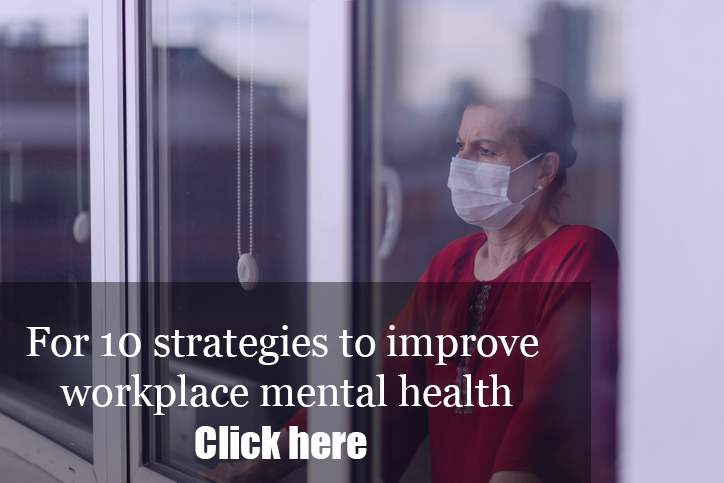The U.S. Capitol riots that occurred Wednesday were difficult for most Americans to watch, with workers nationwide glued to the news for most of the day. Add to that the continuing stress of the COVID-19 pandemic and the post-holiday blues, and organizations are dealing with employees who are feeling more anxious and unsettled than ever.
“It’s a really tricky time to be a human and be a leader right now,” says Jaime Klein, founder and CEO of consulting firm Inspire Human Resources. “Employees are really on edge.”

Jaime Klein of Inspire Human Resources
The mob attack that occurred, halting President-Elect Joe Biden’s election certification, was the latest in a string of difficult events that have had a negative impact on employees’ mental health over the past year. Research has shown that levels of depression, anxiety, stress and burnout are significantly on the rise since the onset of the COVID-19 pandemic. That’s just one reason company and HR leaders need to step up and help employees in light of this week’s events, Klein says.
Related: How HR can ease employee angst following Capitol riots
HRE spoke to Klein about the fragility of employees’ mental health, why leaders must not stay silent on the riots and how they should talk to their employees about the event.
HRE: It’s been a traumatic week, on top of a worsening COVID-19 pandemic, post-election turmoil and everything that’s been happening. Tell me a little about what are employees going through right now.
Klein: We’re in a pandemic. For [many of us], it’s a little colder, a little darker outside. And that’s tricky with mental health. There is a mental health crisis that employees are going through on top of [the Capitol riots]. And we’re right after the holidays and I don’t know anyone who feels like they were living their best life. So this moment we find ourselves in, on Jan. 6, employees don’t have a lot of gas in the tank in emotional reserve.
HRE: Now with these events, what should HR and other company leaders’ role be?
Klein: I think it’s important for leaders at the top of their agendas, for team meetings, for one-on-ones back from the holidays … to hold space to check in and ask folks how they’re doing. Not just, “How are you?” but “How are you really doing?” Seventy-eight percent of the global workforce reported an increase in stress and anxiety in Q4 last year, and depression costs the U.S. economy $220 billion annually. So, there’s an economic advantage for employers to take the moment. For every dollar invested in mental health support, you see a $4 increase in productivity. There really is a business case and a human case for slowing down and checking in on how employees are doing.
Related: Mayer: The employees are not all right
HRE: How can they check-in? How should those conversations go?
Klein: Ask open-ended questions and ask how folks are doing. It’s so hard to find the boundary of what to ask and what not to ask, but just to be very human in this moment and check in and ask how folks are doing. And then try to create a safe space for them to answer that question and help them manage that stress.
If the conversation becomes political, really do everything you can to not engage in the content of their opinion, but more how it feels underneath. Recognize the emotion underneath what they are saying in terms of, “Yes this sounds hard,” or “Yes, this is a complicated time,” so it’s more about their feelings of what’s happening than what’s actually happening. That’s a more productive role for a leader.
HRE: What about mental health resources?
 Klein: Reminding people of their mental health resources is really important—every benefits package should have mental health support. Say to people, “Did you know we offer employee assistance programs?” And give them the phone number. During these times, our clients are really encouraging them to use these resources. The best leaders I know also are sharing examples of how people are using and benefitting from those resources.
Klein: Reminding people of their mental health resources is really important—every benefits package should have mental health support. Say to people, “Did you know we offer employee assistance programs?” And give them the phone number. During these times, our clients are really encouraging them to use these resources. The best leaders I know also are sharing examples of how people are using and benefitting from those resources.
I think we live in a society where there’s a real stigma around mental health. To destigmatize it by saying, “If you’re human and you’re awake, this is a difficult time.” It’s thing on top of thing on top of thing, and it’s really complicated.
HR leaders are not trained social workers; they’re not trained psychologists. It’s not about having the answer, it’s just about listening. As a company leader, if you hear that your employee is struggling, then try to strategize with them—move a timeline, redelegate some work when people are trying to feel like themselves.
HRE: So messaging and personalization seem to be important. But really one big takeaway is making sure not to just sit back and not say anything—that’s the wrong thing to do.
Klein: Yes, absolutely. What we saw in June after the murder of George Floyd was that when leaders were struggling with the words and they were silent because they wanted to get it perfect, their employees took that as being complicit. Similarly, during this time, if a leader doesn’t address it, they will come across as cold and unemotional.